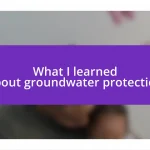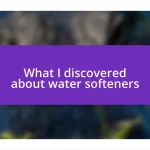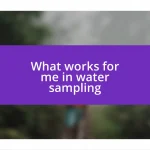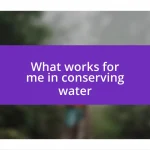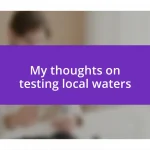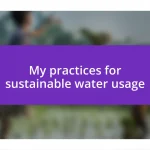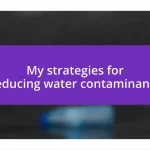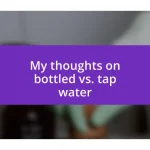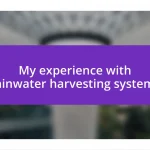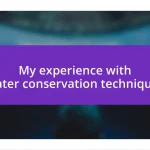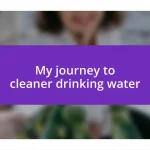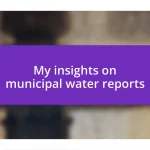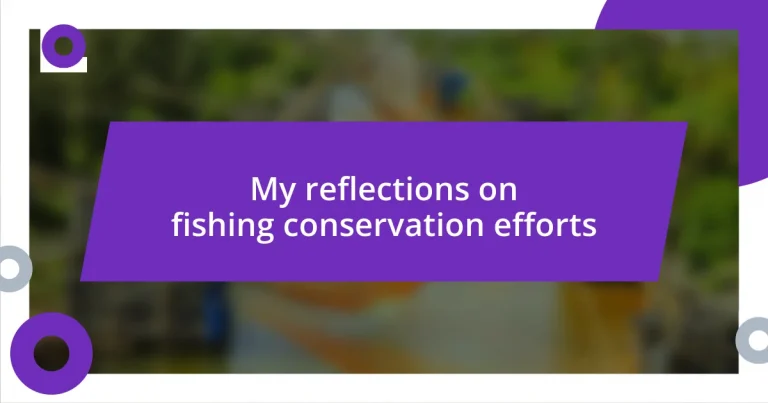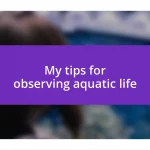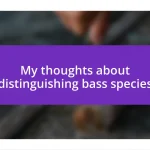Key takeaways:
- The importance of sustainable fishing practices to ensure the health of fish populations and protect aquatic ecosystems for future generations.
- Community involvement and education are crucial for fostering a culture of conservation, where collective efforts and local initiatives can create meaningful change.
- Future challenges in fishing conservation include climate change, balancing conservation with fishing rights, and the ongoing threat of illegal fishing practices.
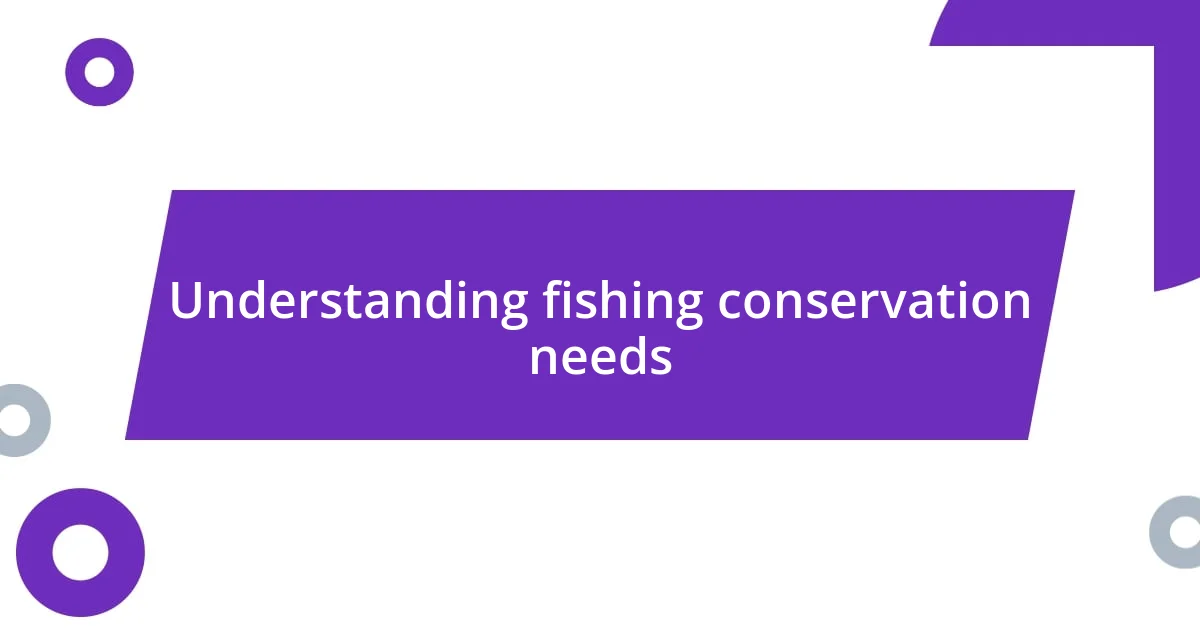
Understanding fishing conservation needs
When I think about fishing conservation needs, I can’t help but reflect on my first fishing trip with my grandfather. The thrill of reeling in a catch was overshadowed by the lessons he taught me about respecting the waters and the fish within them. Have you ever paused to consider what would happen if we didn’t prioritize sustainable practices? Our recreational joys could quickly turn into a haunting void if populations dwindled beyond recovery.
One particular experience stays with me—watching a group of children on a shoreline, eagerly casting their lines. It struck me that they might not inherit the same vibrant ecosystem I had. Understanding the balance between enjoying fishing and protecting it is crucial. If we fail to educate the next generation about conservation, will they ever grasp the true beauty of what they’re missing?
It’s fascinating how local economies rely on fishing yet struggle to recognize the importance of sustainable practices. I often wonder, are we truly valuing the fish that support our livelihoods? For me, supporting conservation efforts is not just a responsibility; it’s a heartfelt commitment to ensure future anglers share the same magic that once hooked my spirit.
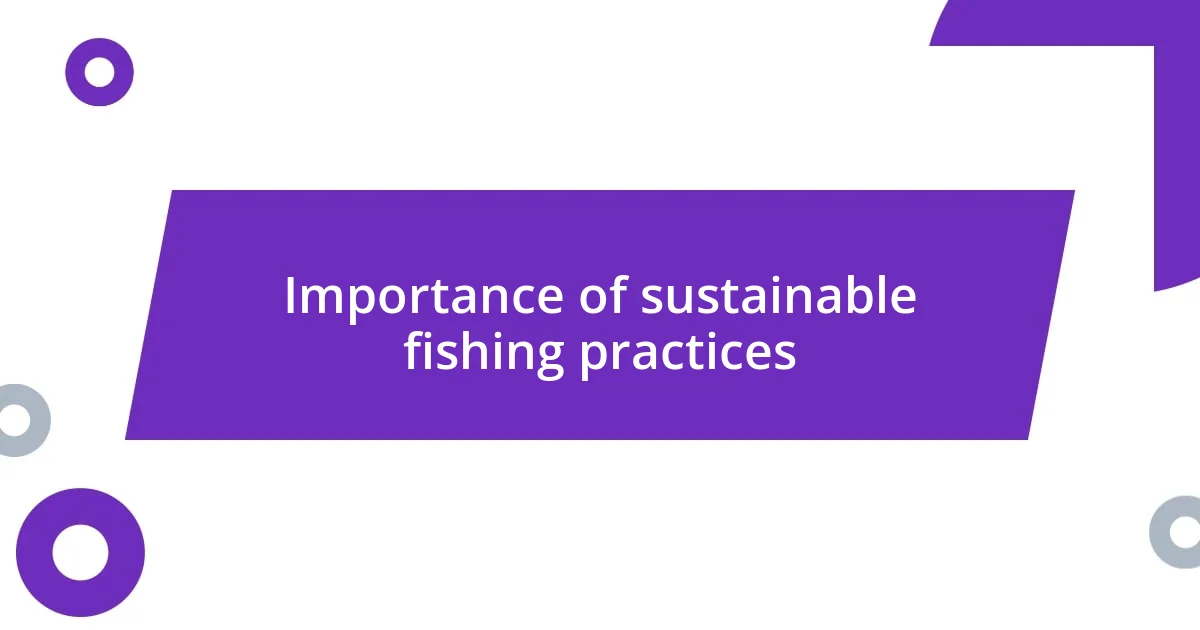
Importance of sustainable fishing practices
Sustainable fishing practices are crucial because they help ensure that our oceans and rivers can support fish populations for generations to come. During a fishing trip a few years back, I felt a deep sadness when a fellow angler bragged about his huge catch, unaware of how such practices could impact future fishing experiences. It’s not just about the thrill of the chase; it’s about preserving the opportunity for others to experience the same joy in the future.
Here are some key reasons why sustainable fishing practices matter:
- Fish Population Health: Preserving the breeding stocks helps maintain the balance of marine ecosystems.
- Ecosystem Integrity: Healthy fish populations contribute to the overall health of aquatic environments, supporting biodiversity.
- Economic Stability: Local communities often depend on fishing for their livelihoods; sustainable practices ensure long-term viability.
- Cultural Heritage: Fishing is often a part of our culture and traditions; conservation efforts help keep those practices alive for future generations.
- Educational Opportunities: Sustainable practices foster awareness and education about fishery management, encouraging responsible behavior among anglers.
I recall the peaceful moment I shared with my daughter while we quietly waited for a bite on our lines—eyes wide with curiosity, she asked why we practice catch and release. I explained that it’s about responsibility and ensuring that we leave enough fish for her own children. It’s in these little moments that the importance of sustainable practices truly resonates—just like a well-cast line, it’s about creating lasting connections to our natural world.
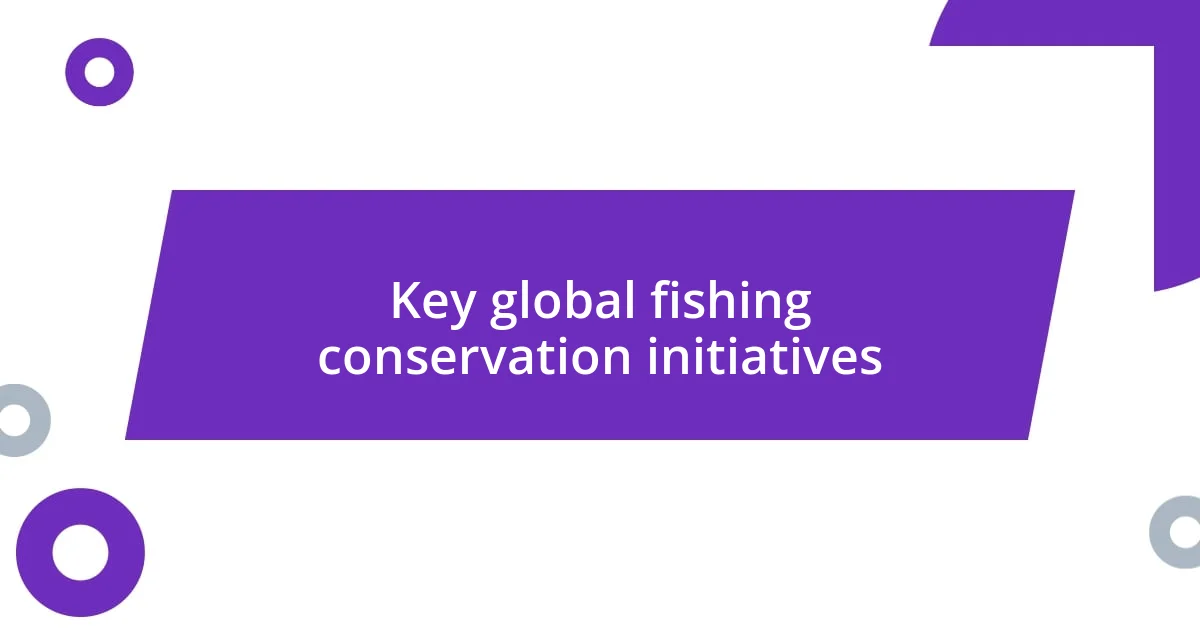
Key global fishing conservation initiatives
Several global initiatives are taking significant strides toward ensuring the health of our fish populations. One notable example is the Marine Stewardship Council (MSC), which promotes sustainable fishing through a certification program. I remember attending a community event where a local fisherman proudly displayed the MSC label on his products. It wasn’t just about boasting; it reflected his commitment to responsible fishing practices and educating others about the importance of sustainability.
Another significant effort is the Global Fishing Watch, which utilizes satellite technology to monitor fishing activities around the world. This initiative opened my eyes to how transparency can drive accountability in the fishing industry. Imagine using technology to protect our oceans in real-time—what a powerful tool that is! Such innovations offer hope that we can curb illegal fishing practices and promote sustainable habits.
Finally, I have immense respect for the efforts of the International Union for Conservation of Nature (IUCN). Their work in creating protected marine areas ensures that certain ecosystems can thrive without human interference. It reminds me of that serene fishing spot I cherish, untouched by commercial pressures. I often wonder if there are enough of these sanctuaries to shelter our dwindling species. These initiatives exemplify the collaborative spirit needed to preserve fish populations and maintain the delicate balance of our aquatic ecosystems.
| Initiative | Focus |
|---|---|
| Marine Stewardship Council (MSC) | Sustainable fishing certification |
| Global Fishing Watch | Monitoring fishing activities via satellite technology |
| International Union for Conservation of Nature (IUCN) | Creating protected marine areas |

Community involvement in conservation efforts
Working alongside my community gives me such a profound sense of purpose when it comes to conservation efforts. I recall a weekend clean-up at a local river where we all gathered with our families to pick up trash. It was empowering to see children, parents, and grandparents joining forces, all driven by a shared love for our natural surroundings. Have you ever been part of a collective effort like that? It’s incredible how that simple act of cleaning can sow the seeds of awareness and responsibility in the younger generation.
Community involvement doesn’t just stop at clean-ups; it manifests in teaching and sharing knowledge, too. I remember sitting around a campfire with fellow enthusiasts, discussing native fish species and their habitats. We shared our personal stories and insights, creating a valuable exchange of information. This exchange gave me a sense of belonging and ignited passion in others to protect our fishing spots. It made me realize just how much we learn from one another in these forums, fostering a culture of respect for our marine life that extends beyond our fishing trips.
What truly resonates with me are those local hero moments, where individuals step up to make a difference. I once met a retired school teacher who started a fishing club aimed at youth, focusing not just on the thrill of catching fish but the importance of conservation. Watching those young faces light up when they learned to identify species and understand their habitats was heartwarming. It’s these grassroots initiatives that create ripples of change, reminding us that every little action counts. Doesn’t it inspire you to think about how you might contribute to your community’s conservation efforts?
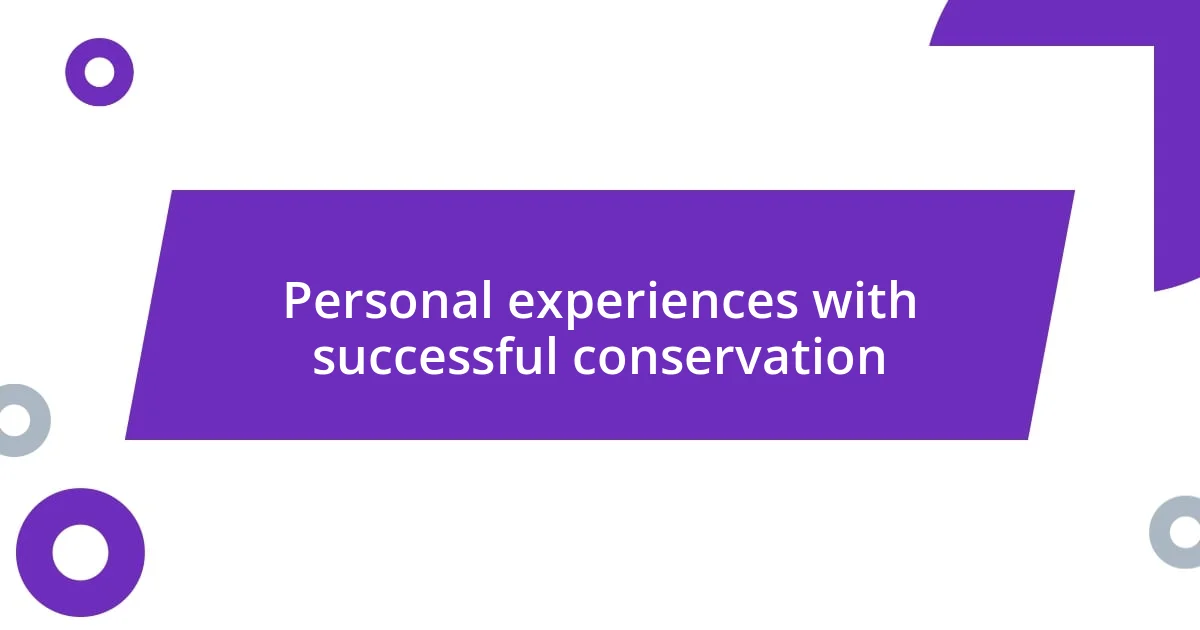
Personal experiences with successful conservation
When I reflect on successful conservation initiatives, one experience stands out vividly in my memory. I was part of a local coastal cleanup event where we partnered with a group dedicated to restoring a nearby reef. It struck me how, in just a few hours, we not only removed debris but also planted new corals. Watching those fragile little pieces of life being carefully placed into the water gave me a sense of hope. Have you ever witnessed the rebirth of an ecosystem? The smiles we shared that day were a testament to the collective spirit of people who genuinely care for our ocean landscapes.
Another experience that truly underscored the power of collaboration was participating in a fishing regulation workshop. The organizers encouraged open discussion about sustainable practices and the declining fish populations. I remember sharing my concerns alongside seasoned fishermen, and it was eye-opening to see how our differing perspectives led to common solutions. Engaging with individuals who have spent years in the waters genuinely fueled my passion for preserving our marine biodiversity. What if more communities embraced such dialogues? I believe that understanding can bridge the gap between generations of fishers and conservationists.
Finally, I can’t forget the exhilaration of volunteering for a tagging project with marine biologists. The moment I helped secure a tag on a beautiful marlin was not just about the science; it felt personal. I vividly recall the rush of adrenaline mixed with responsibility as I understood that we were contributing to vital data collection. This experience reminded me that conservation isn’t just an abstract concept; it’s intertwined with our individual actions. Have you ever been part of something that changed your understanding of nature? It’s those moments that solidify our commitment to protecting the environments we cherish.
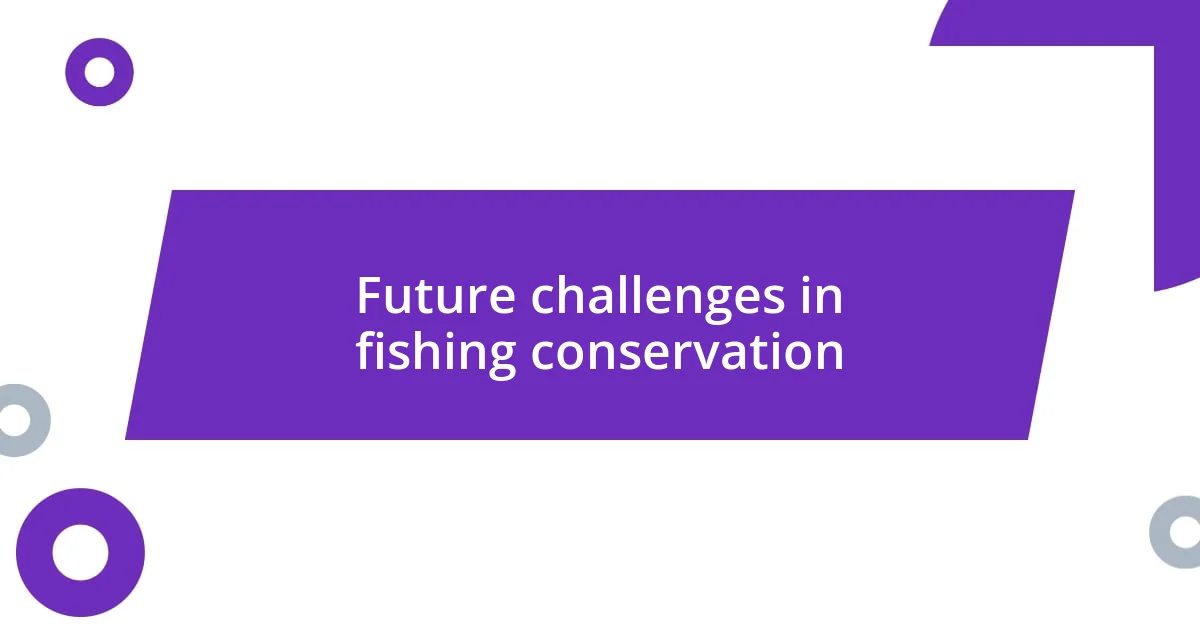
Future challenges in fishing conservation
As I think about the future challenges in fishing conservation, one striking concern is climate change. I’ve noticed how shifts in temperatures have altered fish migration patterns, pushing species into unfamiliar territories. Have you ever found yourself fishing in an area that used to be plentiful but now seems barren? That disconnect is not just frustrating; it’s alarming for the ecosystem and the communities that rely on fishing for their livelihoods.
Another challenge I see looming is the balance between conservation and fishing rights. I remember a heated discussion at a town hall meeting regarding new regulations aimed at protecting spawning areas. While many supported the initiative, others expressed fear of losing their fishing income. It’s a tough dynamic—how do we safeguard our natural resources without jeopardizing the livelihoods of those who depend on them? Isn’t it vital that we find a middle ground that empowers both conservation and the fishing community?
Then there’s the rise of illegal fishing practices, which presents an ongoing threat. One memorable encounter was when I stumbled upon ghost nets during a coastal hike. The sight was gut-wrenching. While efforts are being made to enforce regulations, the temptation to bypass the rules is significant for some. What can we do as a community to support fishers who want to uphold ethical practices? This challenge is not just about policy but about changing heart and mind—getting all stakeholders to recognize that their future is intertwined with sustainable practices.
